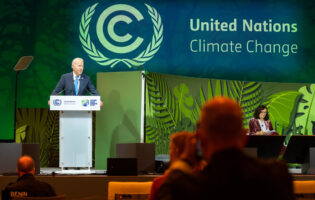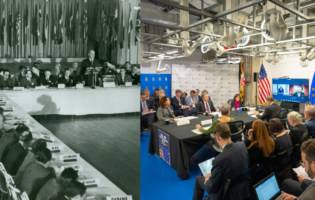European Visions in Davos

Alexander Privitera
AGI Non-Resident Senior Fellow
Alexander Privitera a Geoeconomics Non-Resident Senior Fellow at AGI. He is a columnist at BRINK news and professor at Marconi University. He was previously Senior Policy Advisor at the European Banking Federation and was the head of European affairs at Commerzbank AG. He focuses primarily on Germany’s European policies and their impact on relations between the United States and Europe. Previously, Mr. Privitera was the Washington-based correspondent for the leading German news channel, N24. As a journalist, over the past two decades he has been posted to Berlin, Bonn, Brussels, and Rome. Mr. Privitera was born in Rome, Italy, and holds a degree in Political Science (International Relations and Economics) from La Sapienza University in Rome.
Judging from reactions to her speech at the World Economic Forum on Wednesday, German Chancellor Angela Merkel impressed the crowds. She apparently managed to do so without promising any additional German cash for the European rescue package. Instead, Merkel sketched out a roadmap for recovery.
Merkel’s Davos appearance is an attempt to liberate herself from the perception that her only focus is fiscal rectitude. Wisely, Merkel has now broadened her prescription to include greater competitiveness and solidarity. The Chancellor has signaled that she accepts that all European countries should focus on creating the conditions for growth as much as they should enforce budget discipline. Merkel’s one-sided obsession with austerity seems at last to have morphed into a much more rounded strategy.
However, this was not the only message Merkel had for her audience at the ski resort town of Davos, Switzerland. Her goal was to ingrain the notion that Germany’s commitment to Europe is unwavering. Her message is a simple one: Germany, as the traditional driving force behind further European integration, is back. In Davos, Merkel painted a picture of a not too distant future in which the European Commission could really play the role of a European government and in which the current principal decision making body, the Council (which is made up of heads of government and state), will merely be a second chamber, operating next to a strengthened European Parliament. When, and only when, these steps have been taken can Eurobonds become part of the toolkit needed to finance Europe.
Her words should dispel some of the doubt about Germany’s long term strategy and about the Euro’s fundamental sustainability, concerns that have very little to do with the economic reality and more to do with Europe’s history. They are centered around the question of Germany’s role in Europe.
For most observers, particularly in France, the United Kingdom (U.K.) and the United States (U.S.), it is still hard to accept the idea that big countries might willingly share sovereignty with others. For the U.S., sovereignty was the precondition for independence from its colonial masters. Not surprisingly, it plays a central role in the history of the country. Similarly, for many in France and the U.K. – two European nation states that were born more than five centuries ago – the European Union is still seen as the result of a delicate balance of power between sovereign nations born out of the Second World War. In the Gaullist tradition, Europe is a vehicle, not an end in itself. It is the tool needed to keep Germany under control and elevate France to top position in the old Continent. In the British tradition, the EU is a useful mechanism to prevent any single country from gaining the upper hand on the Continent. It also has the benefit of keeping markets open for business. It would be difficult to make the case in France or the UK that European integration is a matter of ‘historical destiny’. Seen from this perspective, it is the balance of power that really matters. Once the equilibrium shifts, the construction around it cracks.
Since Germany regained its full sovereignty in 1990, observers on both sides of the Atlantic waited for signs that the hybrid European construction had, in effect, run its course. A bigger and more powerful Germany would ultimately try to loosen some of its international shackles and correct the course that had brought it to share so much sovereignty with the EU.
The past decade seemed to provide ample proof that Germany was moving in that direction. Long before Angela Merkel became Chancellor, her predecessor, Gerhard Schroeder, had already tried to paint the reunified Germany as a ‘normal’ nation. As the leader of a fully sovereign nation state, Schroeder tried to deploy German power more assertively and declared that, unlike most of his predecessors, he was not willing to pull out his checkbook every time he needed support in Europe (Scheckbuchdiplomatie). Schroeder even tried to position Germany next to France and the U.K. on the global chessboard by determinedly pursuing a permanent seat at the United Nations (UN) Security Council. Furthermore,he ignored stringent European budget rules as part of the Growth and Stability Pact in 2003, when German and French budget deficits exceeded the criteria of the Maastricht treaty.
When Merkel entered the scene as Chancellor, many hoped that her foreign policy would revert to the traditional pro-European principles of her political godfather Helmut Kohl. But the continent was gripped by Europe fatigue, and she did not. In the late summer of 2011, a visibly frustrated Kohl, one of the Euro’s founding fathers, openly questioned Merkel’s foreign policy compass and said he feared for “his Europe”. Kohl realized that Merkel’s course was much more in tune with Schroeder’s more nationally centered approach. Many observers (including the New York Times) had expressed skepticism for years about Germany as the leading pro European force. Once the EU became a burden for the strong, globally oriented, export driven German economy, so the argument went, Germany had a menu of other options to choose from. When the financial crisis hit in 2007/2008, Merkel’s behavior fit this narrative. She initially refused to make common commitments to help rescue the world economy. And when the euro crisis erupted, Merkel stuck to her guns. Cleaning up the mess was first and foremost a national task. Merkel’s idea of Europe seemed to be centered on an inter-governmental approach, more focused on coordination than integration. Paradoxically, Germany, the champion of European integration, was moving towards a French, Gaullist approach to Europe. Not surprisingly, this shift caused widespread alarm in Brussels. The fact that her relationship with leading members of the European Commission was not always smooth further complicated matters. Finally, with the euro crisis deepening dramatically in 2011, and after a decade of flirtations with a more muscular Germany-first approach , Merkel changed course. In her characteristically slow, methodical fashion, the Chancellor steered the ship back into European waters.
Understandably, for many, particularly in countries such as the U.K. and France, a post national future is still too hard to swallow. However, as the German Foreign minister Guido Westerwelle recently pointed out, the history of the past 60 years has shown that shared sovereignty, particularly in Europe, is the best insurance policy against political instability or worse, war. And to those pointing at current and future challenges, Merkel responds that the EU is more than a successful legacy of the past. As she emphasizes, in a globalized world, crowded with emerging powers, a fractured Europe simply does not stand a chance.
For this pragmatic, somewhat dry German Chancellor, what she described in Davos is the closest she has ever come to a vision of Europe. Early next week, at the next European summit in Brussels, we will see if and how her words translate into concrete action.








